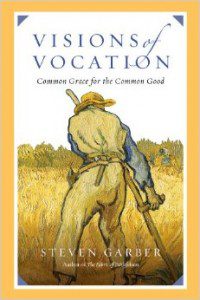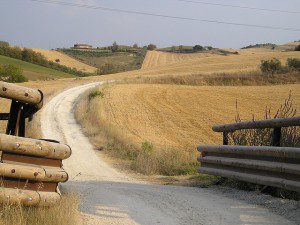 This excerpt from Steve Garber’s book Visions of Vocation is reprinted here with the kind permission of InterVarsity Press. Stay tuned as we continue to occasionally publish excerpts from the book here at Visions of Vocation the blog. And get the book from IVP at this link!
This excerpt from Steve Garber’s book Visions of Vocation is reprinted here with the kind permission of InterVarsity Press. Stay tuned as we continue to occasionally publish excerpts from the book here at Visions of Vocation the blog. And get the book from IVP at this link!
[Steve writes about some of his friends:] In the relationships and responsibilities of common life, they see themselves as implicated in the way the world is and ought to be. They see themselves as having vocations that call them into life, into the world—into a way of knowing that implicates them, for love’s sake. And in the unfolding of my life, living where I have lived, working where I have worked, I have met some of those people.
I can still remember Santiago sitting in the classroom of the American Studies Program, the interdisciplinary semester of studies on Capitol Hill where I taught for many years . Focused on public life and public policy, we had serious, motivated, academically entrepreneurial students from all over America come study with us. Our classes were often taught in a seminar style with pedagogical back and forth— and Santiago always had a hard question. Even at that time he had a sense of what he wanted to do, so when he finished college he returned to Washington for graduate school, digging more deeply into understanding the nature of political economies. One job became another, and soon he was at work all over the world, coming alongside majority world nations who had needs for capital but even more for wisdom and knowledge.
 Some years later he entered into another classroom of mine and brought a bride, Nicole. For years I led a little community that explored visions of Christian spirituality, learning from the wisdom of saints over the centuries by reading and reflecting on their writings. Santiago was Latin American and Nicole was African American, and their marriage seemed to bring together much of the world, wonderfully so. She entered into the State Department after finishing school, taking up the complex questions of international relations from the perspective of US national policy, even as he took them up from the perspective of a USAID-funded group that worked at many of the same questions, but from the position of an adviser to nations wanting assistance.
Some years later he entered into another classroom of mine and brought a bride, Nicole. For years I led a little community that explored visions of Christian spirituality, learning from the wisdom of saints over the centuries by reading and reflecting on their writings. Santiago was Latin American and Nicole was African American, and their marriage seemed to bring together much of the world, wonderfully so. She entered into the State Department after finishing school, taking up the complex questions of international relations from the perspective of US national policy, even as he took them up from the perspective of a USAID-funded group that worked at many of the same questions, but from the position of an adviser to nations wanting assistance.
As I watched Santiago at work, asking questions about what he was doing, and where and why, I began to understand that his work was something like a plumber’s or electrician’s— except that he was working with nations to develop healthy infrastructures so that international aid would make political and economic sense. If a nation needed financial assistance but it did not have a working legal system or a working banking system, then any money would find its way into the proverbial toilet of history. Santiago’s work was focused on building the infrastructure in nations all over the earth, spending days and weeks with nationals in their own nations, helping them see what was needed and then build it.
Why does it matter? All over the earth the rich can be heard. They can find ways, legal or not, to make their case and live their lives. But if courts do not exist, or are patently unfair in systemic ways, then it is the poor who suffer . The same is true for banks, which in the best of worlds work not only for the wealthy but for everyone. If a dollar or peso is given to a bank in trust, then it needs to be there with interest when the depositor needs it. The rich know what to do with their money and can always find a bank somewhere in the world that will take good care of them. But it is the powerless people who live in villages and cities the world over who are the clients of Santiago, as they are the ones whose lives depend on the healthy social ecosystems that are the focus of his work.
Much of his day-by-day labor is with the unemployed and with small businesses, creating venues and structures in which they can find their way into international value chains that produce the goods and services that we consume in the first world. It is critical to link the poor to markets, and through that process to help them understand how countries need to change their production and distribution systems in a way that helps create wealth for everyone, not just the powerful. And then a baby was born and then another, and as with families all over the world, Santiago and Nicole have made choices and then more choices, trying to find a way to be healthy together as a family. How do they take the lessons of international diplomacy and make them work in a home? What is the relationship of habits of heart that must be in place for a nation to work well and the habits of heart that are needed for one family to be healthy? Good questions, and no easy answers. But they have worked at answers and keep living into them.
And then came the day when they announced to the community that they were going to Ecuador for a few years, taking the global commitments they had and focusing on one region, Latin America. In one way it seemed a wonderful way for Santiago to go home and to take his young family with him, showing them what he loved. We sighed but knew that they should go. Now they have come back, settling into the city as a family— but with hearts engaged by the whole world. Santiago continues in his work of building national infrastructures, and Nicole is a young professor in the same graduate program in which she studied, and gives leadership to the boards of the Institute for Global Engagement and International Justice Mission. Together they parent their little boys, teaching them to know the world and to love it— as they do. In a strange way, they live life at thirty-five thousand feet, and yet at the same time their vision of vocation keeps them attentive to life where people live. Living in tensions like that is life, for everyone, everywhere.
Image: Roberto La Forgia, “The Way.”
Taken from Visions of Vocation by Steven Garber. Copyright (c) 2014 by Steven Garber. Used by permission of InterVarsity Press, P.O. Box 1400, Downers Grove, IL 60515-1426. www.ivpress.com











